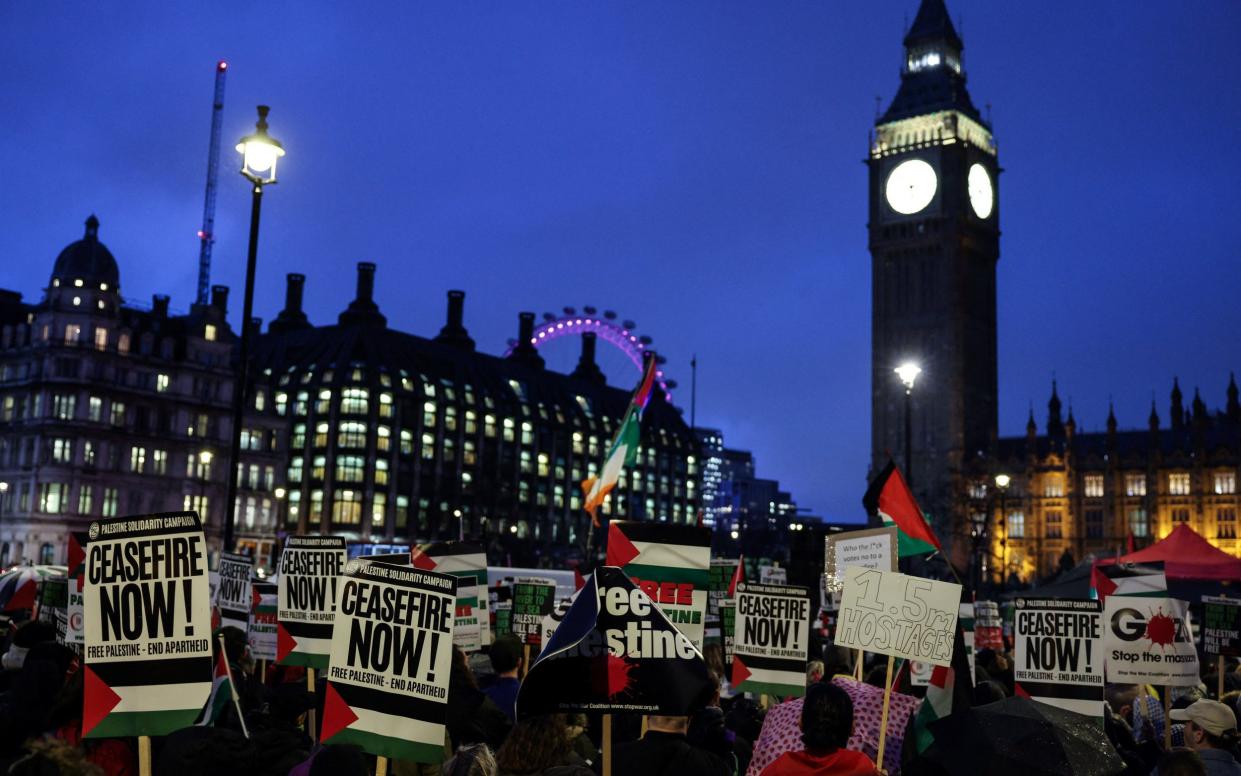Introduce protest exclusion zones around MPs’ offices, says Sunak adviser

Protest exclusion zones should be introduced around MPs’ offices, the prime minister’s official adviser on political violence has recommended in the wake of fresh safety concerns.
Lord Walney will use a forthcoming report to urge Rishi Sunak to extend “buffer zone” powers, which currently cover schools and abortion clinics, to constituency surgeries, Parliament and council chambers.
His recommendation comes after figures from across the political spectrum have been targeted in their constituencies by pro-Palestinian protesters since the Oct 7 Hamas attacks on Israel and the war in Gaza.
On Wednesday, Sir Lindsay Hoyle, the Commons Speaker, said he had chosen a Labour amendment to a motion on the conflict after being warned about threats to the party’s MPs if they were not allowed to support the proposal.
Lord Walney’s review, which was set to be submitted shortly after the Oct 7 attacks but has now been updated, will call for the expansion of expedited public space protection orders.
These orders were backed by MPs in 2022 and approved by the Lords last year following anti-abortion rallies at clinics across the country and demonstrations against Covid vaccines outside schools.

The orders allow the introduction of safe access zones, enabling police to ban anti-abortion protesters from certain activities within a certain radius of a clinic.
The law also empowers police to disperse intimidating protests, which Lord Walney is understood to hope would protect parliamentarians from mobs in their communities.
Pro-Palestinian activists gathered outside the Commons on Wednesday night ahead of planned votes on a ceasefire. In November, hundreds gathered outside the constituency office of Sir Keir Starmer, the Labour leader, following a separate vote on the issue.
Craig Williams, Mr Sunak’s parliamentary aide, has been repeatedly confronted outside events in his Montgomeryshire constituency by activists shouting: “Blood on your hands.”
After Wednesday’s Commons debate on a ceasefire descended into chaos, Lord Walney wrote on X, formerly Twitter: “Our Parliament cannot stand by and allow its proceedings to be influenced by a sense of threat posed to elected representatives from an angry mob gathered outside.”
In a warning echoed by MPs including Robert Jenrick, the former immigration minister, he said: “Liberal democracy fails if this is tolerated.”
Lord Walney is not set to extend his recommendation to MPs’ homes because the Criminal Justice Act already allows police to direct protesters away from a residential dwelling to prevent alarm, distress or harassment.
Police were reminded of their powers by Tom Tugendhat, the security minister, and Chris Philp, the policing minister, after Dorset Police decided not to break up around 80 activists outside the home of Tobias Ellwood, the Tory MP. The protesters accused him of being “complicit in genocide” in Gaza.
Dorset Police said it had attended the scene “to ensure people could exercise their right to protest legally and safely”, adding: “We respect people’s rights to lawful protest.”
Last month, The Telegraph revealed that Lord Walney’s recommendations would also include banning face masks at protests amid fears over the spread of the US-style tactic.
The crossbench peer will call for police to be given new powers to break up intimidating protests outside Parliament and MPs’ offices and is also set to urge a change in the law to let police ban pro-Palestinian marches because of their impact on the Jewish community.

 Yahoo News
Yahoo News 
